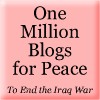 Here's a curious thing. Until the scandal at Abu Ghraib broke, voices denouncing torture in the US peace community were far and few between.* There was School of the Americas Watch and TASSC (God bless 'em!), but that was about it--
Here's a curious thing. Until the scandal at Abu Ghraib broke, voices denouncing torture in the US peace community were far and few between.* There was School of the Americas Watch and TASSC (God bless 'em!), but that was about it--
- despite the fact that both Amnesty International and Human Rights Watch regularly document the widespread use of torture throughout the world;
- despite the fact that torture inevitably accompanies war, and continues after war has ended;
- despite the fact that the malfiguration inflicted by torture is at least as grave a wrong as the destruction wrought by warfare;
- despite the fact that torture makes no distinction between combatants and noncombatants;
- despite the fact that torture, unlike war, has been unequivocally condemned by the UN;
- despite the fact that no reputable ethicist or policy wonk has dared to publicly defend a "just torture" position;
- despite the fact that torture, like war, accomplishes nothing useful or fruitful;
- and despite the fact that the CIA has tortured or condoned torture with the tacit approval of ever US President since WWII.
Why this silence? Ignorance? Indifference?
Probably not the latter, and not quite the former. Denial might be more of an explanation. Prior to Abu Ghraib, most of us, even those most critical of US militarism, were in denial. Our vision of the US just didn't allow for the possibility that we--as opposed to the sordid little juntas and regimes we supported--actually twisted the bodies and minds of fellow humans in torture chambers. That wasn't the American way, and so it simply wasn't on the radar. Even suggesting the possibility seemed too ridiculous to take seriously. Why ruin what thin credibility the peace movement had with an already suspicious American public by making wild, chicken little allegations about torture?
 Looking back--and I've been a member of the peace community that I'm criticizing for over 30 years, and so am implicated up to my eyeballs in its silence--this naivete seems incredible. The ugly facts really were there for us to see, and other nations certainly weren't as blind to them as we. But for the most part, we just couldn't or wouldn't take notice of them. Even now, too many of us in the peace community would like to keep torture as a sidebar issue. Just the other day, an acquaintance of mine worried that it was a "distraction" from the "real issue" of war--as if the two can really be separated.
Looking back--and I've been a member of the peace community that I'm criticizing for over 30 years, and so am implicated up to my eyeballs in its silence--this naivete seems incredible. The ugly facts really were there for us to see, and other nations certainly weren't as blind to them as we. But for the most part, we just couldn't or wouldn't take notice of them. Even now, too many of us in the peace community would like to keep torture as a sidebar issue. Just the other day, an acquaintance of mine worried that it was a "distraction" from the "real issue" of war--as if the two can really be separated.But that's ridiculous. It's time for a change. It's time for the US peace community to affirm that torture is a big box item. It's time to end the silence.
______
*In my library, for example, I have over 1,000 volumes on just peacemaking, nonviolent conflict resolution, war and peace, and so on. Fewer than 1% of those published before 2005 even mention torture.





|